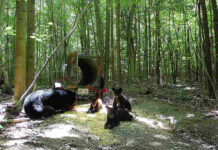Last week, I had never heard of John Christy. This week, he’s my hero.
Christy is the director of the Earth System Science Center at the University of Alabama. He also participated in the U.N.’s Intergovernmental Panel on Climate Change and can now claim an unofficial tiny portion of the panel’s Nobel Peace Prize. You know, the one shared by Al Gore.
But while Gore dazzled reporters in Stockholm and then jet-setted to the ballyhooed climate talks in Bali, Christy took pen in hand to remind us mere mortals that an “extraordinarily complex climate system” is nearly impossible to measure, let alone understand.
“It is my turn to cringe when I hear overstated confidence from those who describe the projected evolution of global weather patterns over the next 100 years, especially when I consider how difficult it is to accurately predict that system’s behavior over the next five days,” Christy wrote in the Wall Street Journal last month.
He often quotes his high school physics teacher who reminded students to begin all their scientific statements with “At our present level of ignorance, we think we know …”. I don’t believe I’ve ever heard those words, particularly a confession of ignorance, from Gore, whose carbon footprint Christy deliciously writes “would stomp my neighborhood flat.”
Christy holds a Ph.D. in atmospheric science and is a fellow in the American Meteorological Society. He has worked with climate models for much of his career. But he readily admits model projections can’t reliably predict climate changes and there’s “no guarantee that energy policies intended to deal with climate change will have the desired effect, either in sign or magnitude,” as he told the Senate Commerce, Science and Transportation Committee Nov. 14.
Christy doesn’t deny that concentrations of atmospheric greenhouse gases like carbon dioxide are increasing. And those gases do trigger the earth’s atmosphere and ocean to retain more heat energy. But no one knows, nor can one simply calculate, the impact of that extra energy.
That’s not what we want to hear. We want to know what we’re supposed to do to reverse this trend. We want answers. We want action.
But at what cost? At the heart of economists’ cost-benefit ratios are these questions: What are the costs and what are the gains? What are individuals around the world willing to pay to achieve a particular outcome? And can those outcomes be calculated and quantified and then verified? Do we know with any certainty that doing ABC will bring about XYZ by 2050?
Several states plan to force residents to buy cars over the next 10 years that average 43 miles per gallon. “Even if you applied this law to the entire world, the net effect would reduce projected warming by about 0.05 degrees Fahrenheit by 2100, an amount so minuscule as to be undetectable,” Christy wrote in his Journal comments. “Global temperatures vary more than that from day to day.”
Is the climate changing? Yes, just as it always has and always will. Are severe weather conditions a sure sign that the global warming sky is falling and humans are to blame? No, weather phenomenon are not so easily explained.
Some denounce Christy as a “global warming denier.” I support him as a voice of reason, not propaganda.
(Editor Susan Crowell can be reached at 800-837-3419 or at editor@farmanddairy.com.)
Get 4 Weeks of Farm and Dairy Home Delivered












